The telecoms industry heavily relies on efficient and robust systems to manage various business operations. Business Support Systems (BSS) and Operational Support Systems (OSS) are crucial IT systems that enable telecom companies to deliver seamless services. However, there’s a lot of confusion surrounding this topic. In this blog, we’ll define the purpose of BSS and answer the most frequently asked questions about BSS telecom.
What does BSS stand for in telecom?
To start with, the term BSS stands for Business Support System. It’s also sometimes referred to as a business interface.
What is BSS in telecom?
BSS in telecom refers to the set of tools and systems that support telecom companies in managing and optimising customer-centric operations. These systems focus on the business aspects of telecoms rather than the technical aspects. BSS facilitates seamless interactions between service providers and end-users, from orders to resolving billing issues.
Other functions include:
- Invoicing/Billing
- Revenue management
- Handling customer orders
- Subscriptions
- Customer notifications
- Managing customer data
- Service fulfilment
- Customer relationship management (CRM)
Due to the significant impact on the overall customer experience, these systems are vital to the success of telcos. Effective BSS solutions enable telcos to simplify processes, monitor service quality, and promptly address customer concerns.
BSS architecture in telecom
The BSS telecom architecture typically includes various layers and components for different business functions. These layers include:
- Presentation Layer
- Application Layer
- Data Layer
- Integration Layer
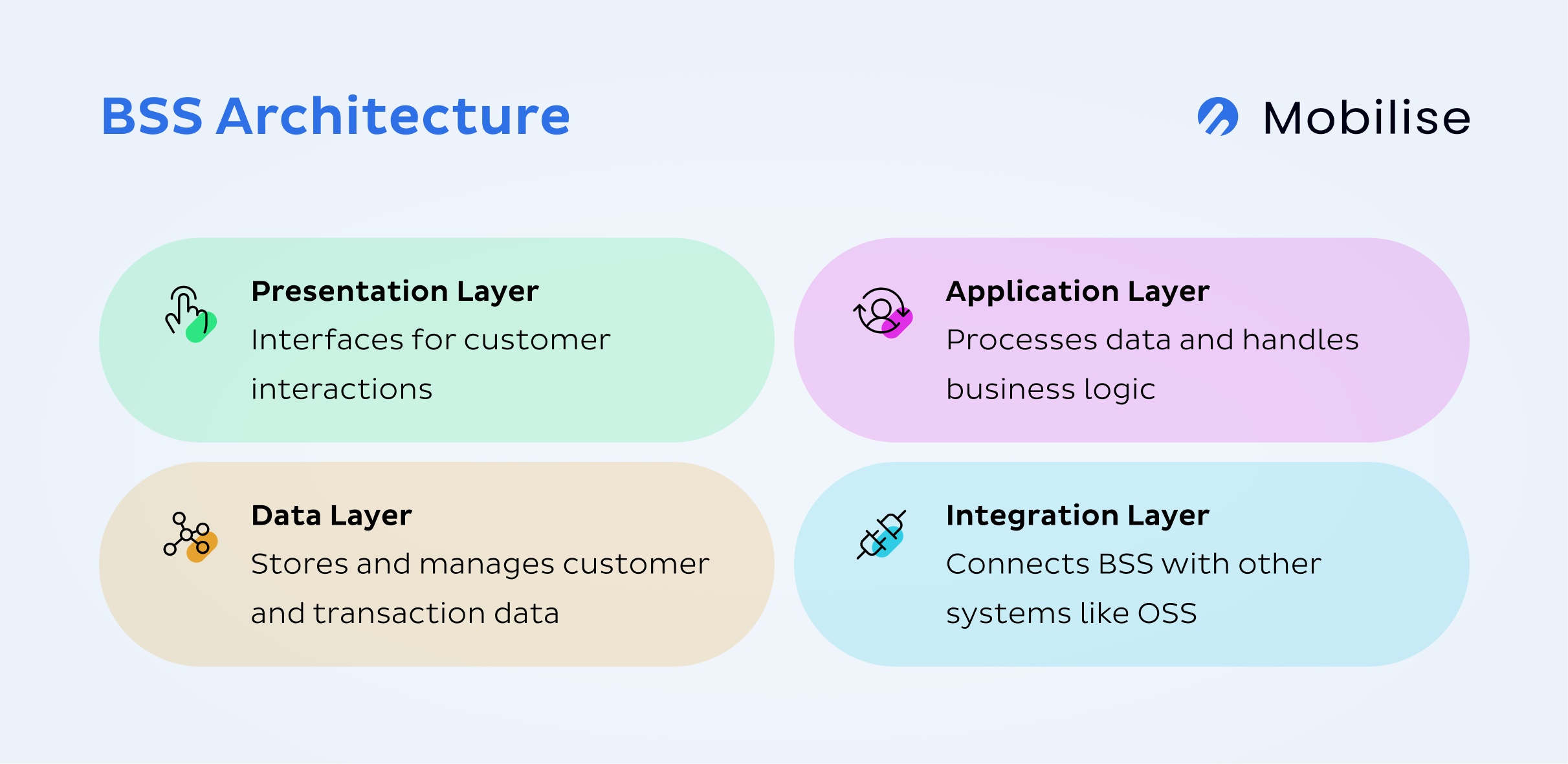
Core components of telecom BSS
The following are core components of BSS in telecom:
Customer Relationship Management (CRM)
CRM within BSS handles all aspects of customer management, from data collection and analysis to relationship management and customer support. It ensures telecom operators can efficiently manage customer interactions and provide personalised services.
Order Management
Order management systems within BSS manage the entire lifecycle of an order, from initial order capture to fulfilment. It includes tracking orders, managing inventory, and coordinating with other systems to deliver a timely service.
Billing Systems
Billing systems are essential components of BSS that handle various billing methods, including pre-/post-paid and convergent billing. They ensure accurate billing, manage payment collections, and provide customers with clear and detailed billing information.
Revenue Management
It involves tools and strategies for revenue assurance, fraud management, and cost control. These tools help telecom operators maximise revenue, minimise losses, and maintain financial health.
Service Provisioning
This core component in BSS supports the activation of services and management of service configurations. It ensures that services are delivered to customers promptly and efficiently, maintaining a high-quality service.
BSS telecom features
The features of BSS telecom ensure seamless operation and enhance customer satisfaction by providing efficient service delivery and accurate billing.
The features include:
- Customer management
- Order processing
- Billing and invoicing
- Revenue management
- Service activation
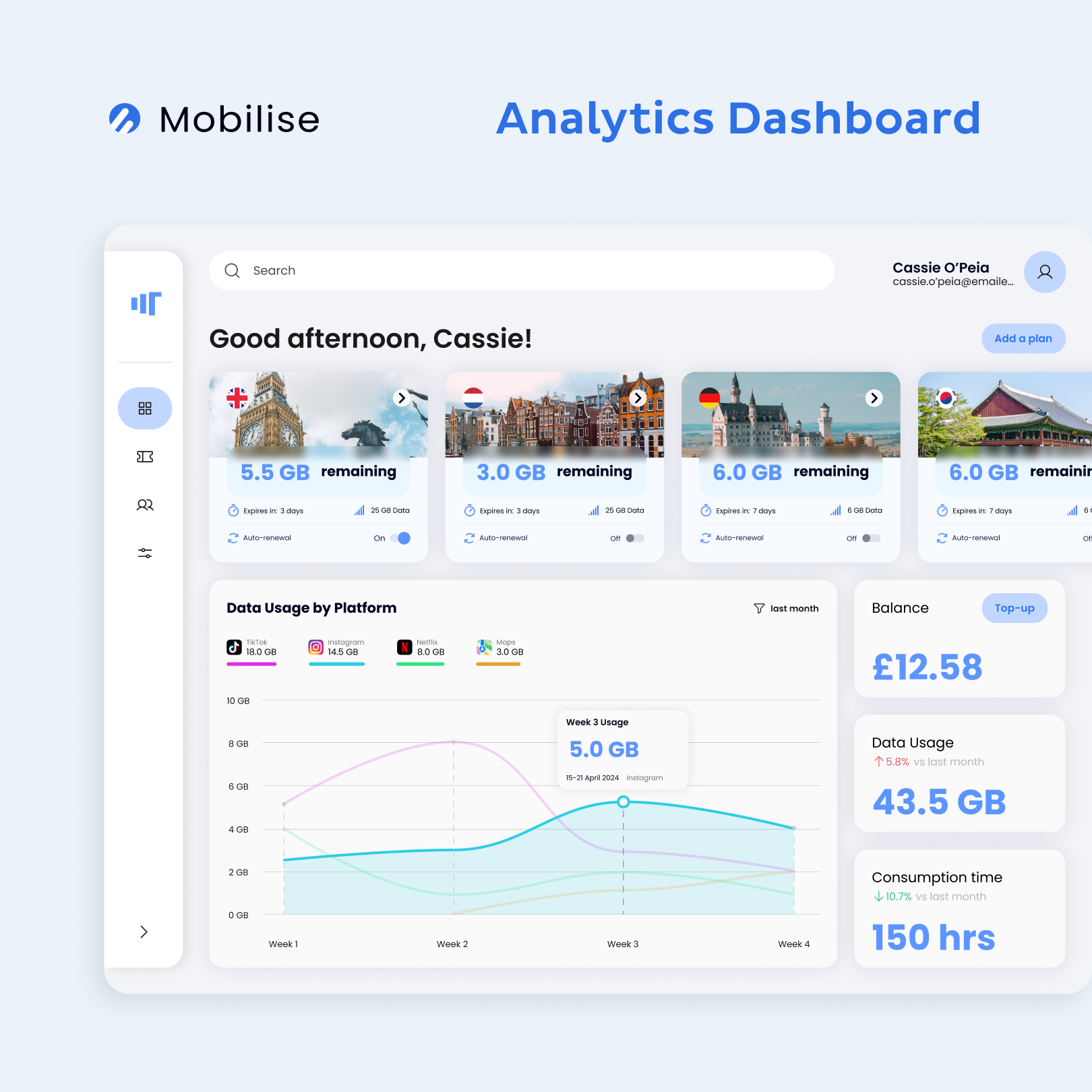
The importance of BSS telecom
One of the key benefits of BSS telecom is its ability to enhance customer satisfaction. By utilising CRM tools, operators can better understand and manage their customer relationships, leading to improved customer service and support. Accurate billing and timely service delivery also contribute to a positive customer experience, ultimately leading to higher satisfaction and loyalty.
From a business perspective, BSS supports revenue growth by enabling operators to manage their billing processes and ensure effective and accurate service invoicing. This helps maximise revenue and reduces revenue leakage due to billing errors. Furthermore, operational efficiency is improved as BSS streamlines internal processes, reduces manual intervention, and provides operators valuable insights into their business operations.
Challenges facing telecom BSS
Regulatory Compliance
Regulatory compliance is a significant concern for telecom BSS. Telecom operators face the challenge of navigating complex regulations to ensure that their BSS systems adhere to industry standards and legal requirements. This involves staying on top of ever-changing regulations and adapting BSS systems to remain compliant.
Data Security and Privacy
Data security and privacy are paramount for BSS due to the sheer volume of sensitive customer information processed. Telecom operators must implement robust security measures to safeguard customer data and uphold their trust.
Scalability and Flexibility
Scalability and flexibility are also vital considerations for BSS systems. They need to be adaptable to the rapidly evolving telecom landscape, capable of handling increasing data volumes and supporting new services and business models. This ensures that BSS systems can grow alongside the telecom industry and effectively meet the changing needs of customers and the market.
Future Trends in Telecom BSS
The future of Business Support Systems (BSS) in the telecom industry will experience several significant advancements. One of the key trends expected to shape the landscape is the continued adoption of cloud-based solutions. This shift towards cloud adoption will bring greater flexibility, scalability, and cost-efficiency for telecom operators.
Additionally, increased service automation is anticipated to be pivotal in streamlining operations and enhancing customer experiences. Automation of routine tasks and processes can lead to operational efficiency gains, enabling telecom operators to allocate resources more strategically.
Another crucial trend is the implementation of advanced data management techniques within BSS. With the surge of data in the telecom sector, leveraging advanced data management methods will be essential for extracting valuable insights and driving informed decision-making. These techniques will enable telecom operators to optimise their service offerings, improve customer targeting, and enhance overall operational performance.
Impact of 5G
One significant development that has dramatically impacted the telecoms industry and BSS systems is 5G. The higher data speeds and low-latency capabilities of 5G networks will necessitate significant enhancements in BSS service management, billing, and customer support. Telecom operators must revamp their systems to accommodate the unique requirements of 5G services, ensuring seamless integration and support for innovative offerings enabled by this next-generation technology.
Sustainable Practices
In addition to technological advancements, BSS can play a pivotal role in supporting sustainable practices within the telecom industry. By optimising resource usage and enabling the delivery of digital services that reduce environmental impact, BSS can contribute to broader sustainability goals. Telecom operators can leverage BSS to implement environmentally friendly practices, reduce their carbon footprint, and enhance their corporate social responsibility profiles. This alignment with sustainable practices benefits the environment, fosters a positive brand image, and enhances customer loyalty.
What is OSS in telecom?
OSS (Operational Support System) in telecom refers to systems used to manage network operations, including network inventory, provisioning, fault management, and performance monitoring. OSS ensures the network infrastructure’s smooth functioning and supports telecom service delivery.
Telecom OSS features
OSS features ensure efficient network operations and support delivering high-quality services to customers. It includes:
- Network management
- Service provisioning
- Fault management
- Performance monitoring
What is OSS architecture?
OSS architecture includes components like:
- Network management systems
- Service management systems
- Operational databases
These components work together to manage and optimise network operations and service delivery.
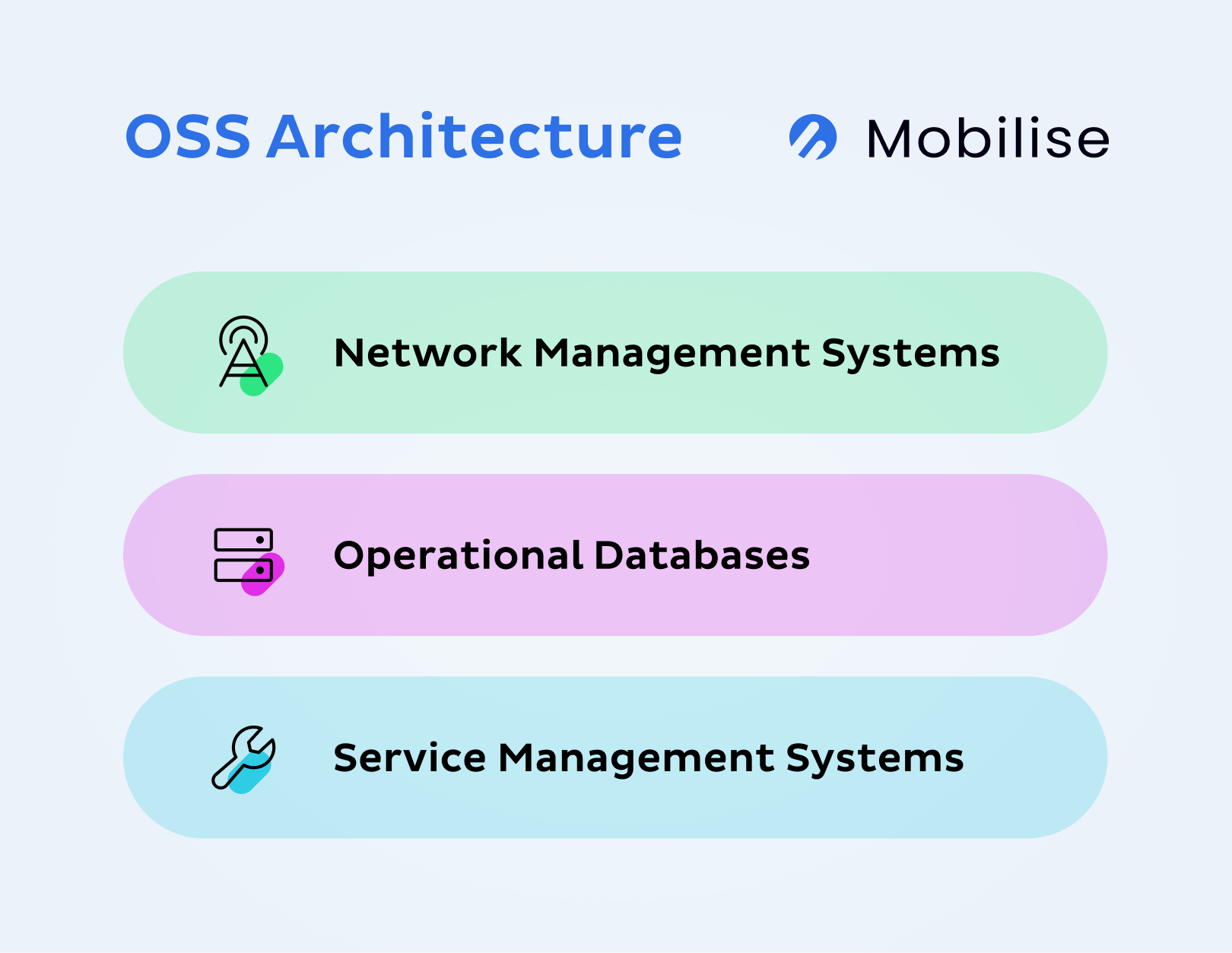
What is the difference between OSS and BSS in telecom?
While BSS focuses on customer-facing activities like billing and customer management, OSS handles network-facing activities such as network management and service provisioning. Together, they ensure comprehensive telecom operations.
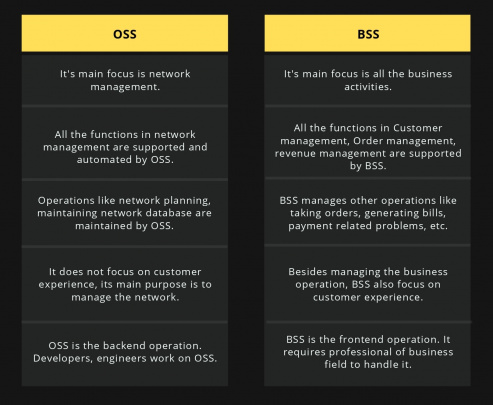 Source: WisdomPlexus
Source: WisdomPlexus
BSS and OSS integration
As BSS and OSS are complementary systems rather than competing, telcos often use and integrate the two systems to improve end-to-end telecom services. This integration enables the seamless flow of real-time data between customer management and network operations, facilitating efficient service delivery and accurate billing.
However, achieving a successful integration between BSS and OSS comes with its own set of challenges. Common integration challenges include maintaining data consistency across systems, ensuring interoperability between different systems and platforms, and synchronising real-time data effectively.
To address these challenges, it’s important to consider implementing standardised protocols that enable different systems to communicate effectively. Also, using middleware solutions can bridge BSS and OSS, facilitating data exchange and interoperability. Furthermore, standardised data protocols can play a vital role in ensuring the accuracy and consistency of data across integrated systems.
Why do OSS and BSS work better together?
Integrating BSS with OSS is vital for seamless operations and real-time data flow. It ensures that customer-facing activities are well-coordinated with network operations, enhancing overall service delivery and customer satisfaction.
Best BSS solution in telecom
One of the best BSS solutions in telecom is HERO, a comprehensive platform that integrates customer management, billing, revenue management, and service provisioning. HERO offers scalability, flexibility, and robust security, making it an ideal choice for modern telecom operators looking to upgrade their current BSS systems.
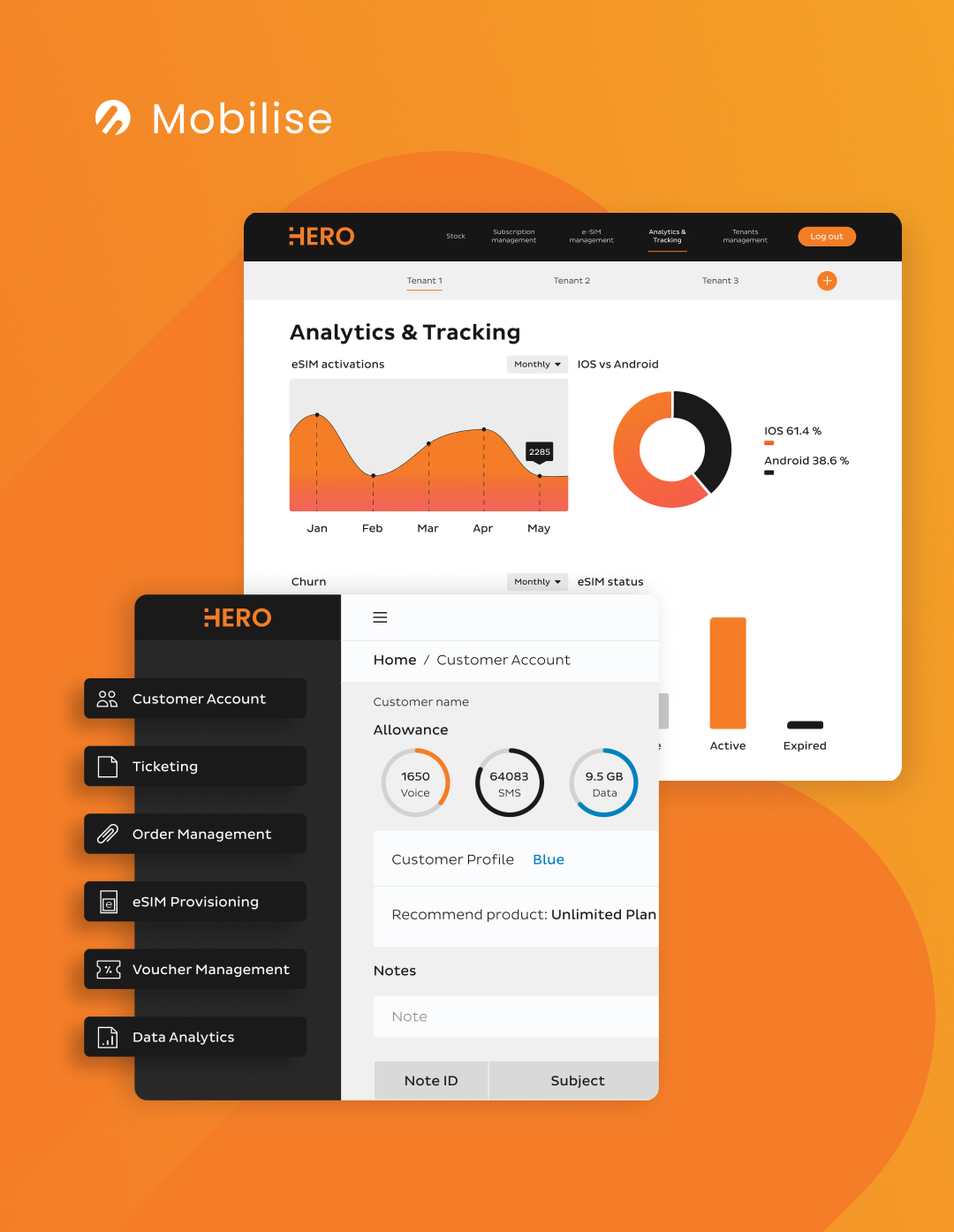
Conclusion
In summary, BSS and OSS are integral components of telecom operations. BSS manages customer-facing activities, while OSS handles network operations. They ensure seamless service delivery, accurate billing, and efficient network management.
The evolution of BSS and OSS is essential for the future of telecom. As technology advances, telecom operators must adopt modern BSS and OSS solutions to stay competitive and meet customer expectations.
To stay ahead in the telecom industry, consider upgrading your BSS practices with innovative solutions like HERO. Contact us today to explore how we can help you optimise your telecom operations and enhance customer satisfaction.



